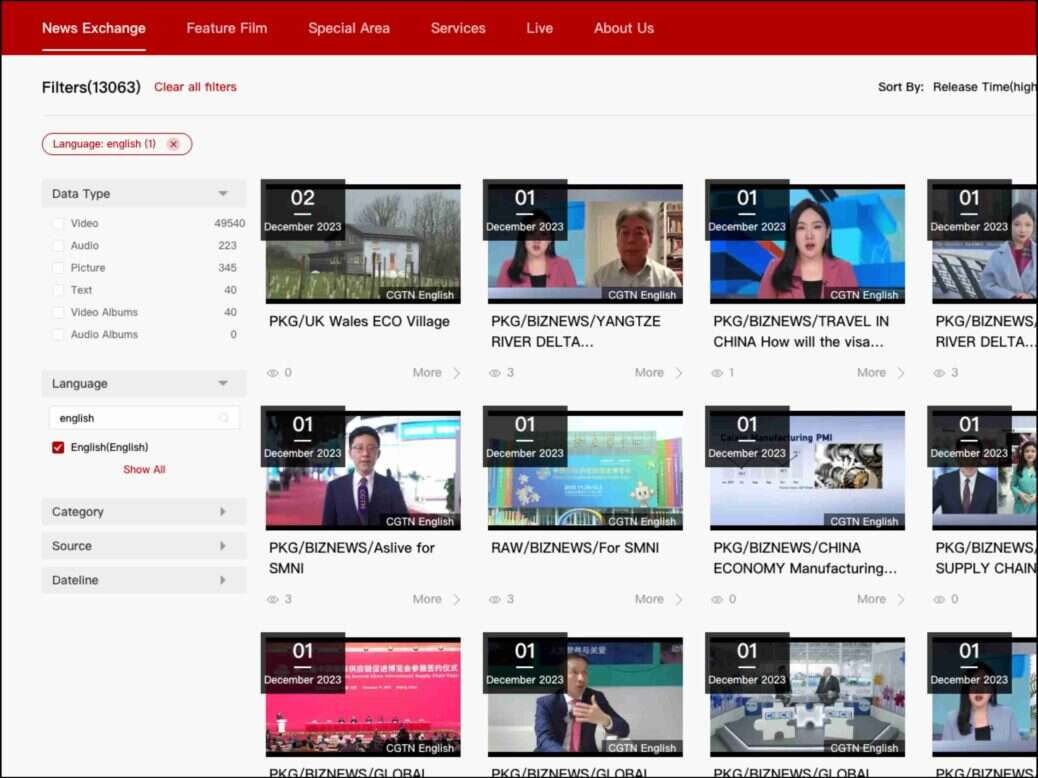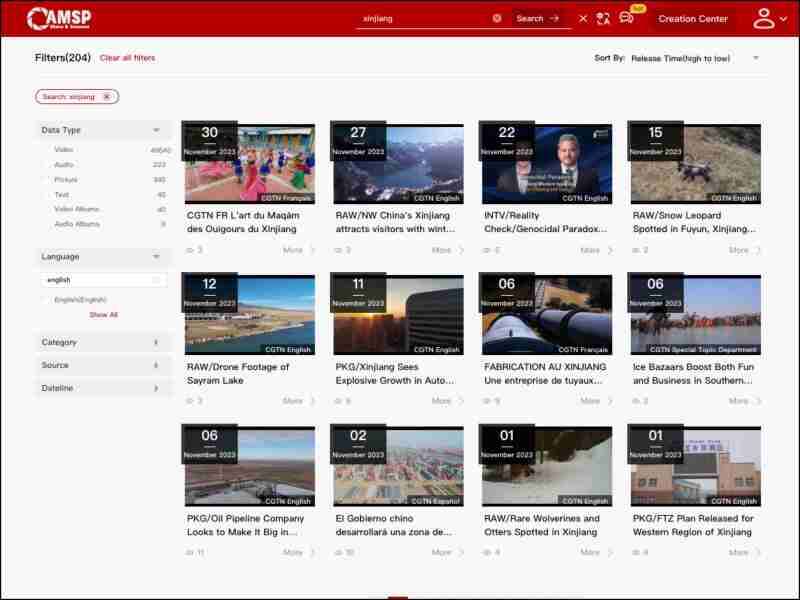
Chinese state broadcaster CGTN is distributing free professional video news packages that often advance the goals of the Chinese government.
CGTN had its broadcast licence revoked by regulator Ofcom in February 2021. The outlet now appears to have effectively set up a video news agency – but one that, unusually, distributes its content with no expectation of payment.
Most of the videos on CGTN’s content exchange, named the All Media Service Platform (AMSP), are conventional television news packages. But they also include numerous segments giving favourable coverage to Chinese government policy or ostensibly “fact checking” unflattering narratives, including widely-reported claims of human rights abuses in Xinjiang.
What is CGTN’s All Media Service Platform?
CGTN’s content sharing service AMSP currently hosts some 49,000 videos, with dozens more uploaded each day.
Some of the videos are hard news: for example throughout October and November the platform has featured extensive on-the-ground coverage from within the Gaza Strip. The site also hosts traditional press pool footage, often depicting trips and speeches made by Chinese government ministers.
However, AMSP also features numerous packages about Chinese government policy, foreign development work and economic successes. Typical videos have run under titles like “Chinese solar equipment empowers Europeans to reduce electricity costs” or “China helps Brazil take sustainable steps in soybean trade”.
On issues like the independence of Taiwan from mainland China, or the reported detention of up to a million ethnic Uyghurs in China’s western Xinjiang region in recent years, AMSP videos consistently advance the Chinese government’s stance.
One interview in CGTN’s “Reality Check” strand for example was titled “People who support independence or separatism of Taiwan are indulging in fantasy”. An August interview with some Taiwanese students was headlined: “Taiwan Youth Eager to Create Stronger Ties with Mainland via Art Culture”.
Most coverage of Uyghurs or Xinjiang on AMSP focuses on the ways Chinese government policy has benefitted the region economically. What little content does explicitly address claims of a genocide against the majority-Muslim Uyghur population consistently expresses the government view: for example one video uploaded last month, also under the “Reality Check” branding, was titled: “Genocidal Paradox: Exposing Western hypocrisy on Xinjiang and Gaza”.

Who uses AMSP?
AMSP formally launched in February 2022 ahead of the Beijing Winter Olympics. Although the overwhelming majority of the videos have been uploaded by Chinese state media, AMSP is ostensibly a content exchange, allowing all members to upload video for any other member to freely use.
A spokesperson for AMSP told Press Gazette that “more than 600 media outlets worldwide have joined” the platform, including Reuters and Newsweek, although neither of those publishers have uploaded content to AMSP.
The exchange seems to have focused on signing up publishers in developing economies. Numerous broadcasters in Central Asia and Eastern Europe are identified as partners in a non-exhaustive list on the site, and a 2022 CCTV press release said the chief executive of Chad’s Tchad24 news channel had signed a “cooperation agreement” with AMSP. The same release carried a quote from the chief executive of Kenya’s Switch TV saying that another Chinese state wire agency, CCTV+, “has become a significant source of news content for our station”. Switch TV’s website carries large amounts of English-language Chinese content.
In September of this year the US State Department published a report alleging that the Chinese state had spent “billions of dollars” building international media networks to help it distribute strategically useful narratives overseas. The report referred to “content-sharing agreements with foreign news outlets” as part of that strategy, some of which it claimed – without citing examples – “include exclusivity clauses that prevent them from reaching agreements with Western-sourced wire services”.
CGTN’s UK broadcast licence was revoked after Ofcom determined the channel was ultimately controlled by China’s governing Chinese Communist Party. CGTN and four other Chinese news agencies had already been designated as foreign government functionaries by the US State Department in 2020.
Media partnerships between Chinese state outlets and international news organisations have come under scrutiny previously. The Daily Telegraph, New York Times, Washington Post and Wall Street Journal have all carried paid supplements from the government-owned China Daily newspaper in the past.
A spokesperson for CGTN approached Press Gazette in August offering AMSP membership, saying the outlet was “seeking global media partners”.
They added that, “to foster positive relationships with our international media partners, the content on our platform is completely copyright free”.
Asked how CGTN benefits from the free service, the spokesperson said: “In the future, the platform will also incorporate an online transaction function, through which users can tag price for their high-quality programmes for potential copyright transactions.”
Press Gazette asked whether the service was ever likely to turn a profit, and if not what prompted CGTN to set AMSP up. The spokesperson said: “Our mission is to build a fully interactive media platform with integrity and professionalism.
“We aim to provide high-quality content exchange and customised services to users worldwide. Through mutual learning and collaboration with reliable partners, we strive for collective growth.”
Asked whether the Chinese government had any role in the creation or operation of AMSP, the spokesperson said: “We appreciate your concerns. However, regarding the question you’ve posed, we are unable to provide more information at this time. Currently, we can only refer to publicly available information.”
Press Gazette approached Reuters and Newsweek asking the extent of their involvement with AMSP. Newsweek did not respond, but a spokesperson for Reuters said: “Reuters does not distribute its content through the All Media Service Platform (AMSP) or use the platform to download content.”
Email pged@pressgazette.co.uk to point out mistakes, provide story tips or send in a letter for publication on our "Letters Page" blog
